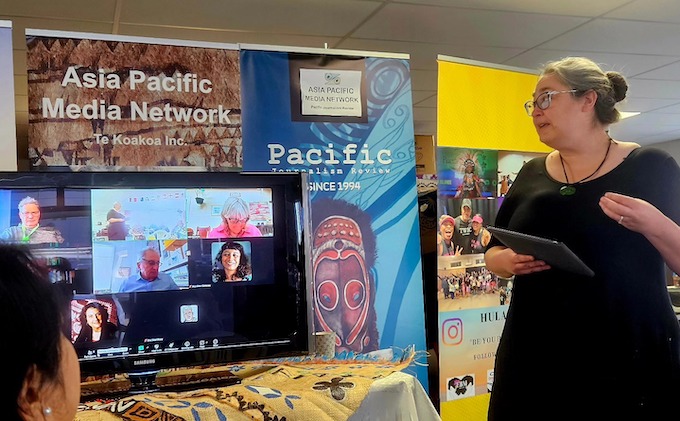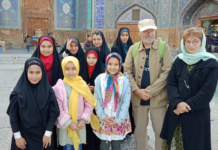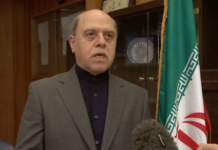
COMMENTARY: By Mandy Henk
When the US Embassy knocked on my door in late 2024, I was both pleased and more than a little suspicious.
I’d worked with them before, but the organisation where I did that work, Tohatoha, had closed its doors. My new project, Dark Times Academy, was specifically an attempt to pull myself out of the grant cycle, to explore ways of funding the work of counter-disinformation education without dependence on unreliable governments and philanthropic funders more concerned with their own objectives than the work I believed then — and still believe — is crucial to the future of human freedom.
But despite my efforts to turn them away, they kept knocking, and Dark Times Academy certainly needed the money. I’m warning you all now: There is a sense in which everything I have to say about counter-disinformation comes down to conversations about how to fund the work.
- READ MORE: US backing for Pacific disinformation media course casualty of Trump aid ‘freeze’
- Other Mandy Henk reports

There is nothing I would like more than to talk about literally anything other than funding this work. I don’t love money, but I do like eating, having a home, and being able to give my kids cash.
I have also repeatedly found myself in roles where other people look to me for their livelihoods; a responsibility that I carry heavily and with more than a little clumsiness and reluctance.
But if we are to talk about President Donald Trump and disinformation, we have to talk about money. As it is said, the love of money is the root of all evil. And the lack of it is the manifestation of that evil.
Trump and his attack on all of us — on truth, on peace, on human freedom and dignity — is, at its core, an attack that uses money as a weapon. It is an attack rooted in greed and in avarice.
In Trump’s world, money is power
But in that greed lies his weakness. In his world, money is power. He and those who serve him and his fascist agenda cannot see beyond the world that money built. Their power comes in the form of control over that world and the people forced to live in it.
Of course, money is just paper. It is digital bits in a database sitting on a server in a data centre relying on electricity and water taken from our earth. The ephemeral nature of their money speaks volumes about their lack of strength and their vulnerability to more powerful forces.
They know this. Trump and all men like him know their weaknesses — and that’s why they use their money to gather power and control. When you have more money than you and your whānau can spend in several generations, you suddenly have a different kind of relationship to money.
It’s one where money itself — and the structures that allow money to be used for control of people and the material world — becomes your biggest vulnerability. If your power and identity are built entirely on the power of money, your commitment to preserving the power of money in the world becomes an all-consuming drive.
Capitalism rests on many “logics” — commodification, individualism, eternal growth, the alienation of labour. Marx and others have tried this ground well already.
In a sense, we are past the time when more analysis is useful to us. Rather, we have reached a point where action is becoming a practical necessity. After all, Trump isn’t going to stop with the media or with counter-disinformation organisations. He is ultimately coming for us all.
What form that action must take is a complicated matter. But, first we must think about money and about how money works, because only through lessening the power of money can we hope to lessen the power of those who wield it as their primary weapon.
Beliefs about poor people
If you have been so unfortunate to be subject to engagement with anti-poverty programmes during the neoliberal era either as a client or a worker, you will know that one of the motivations used for denying direct cash aid to those in need of money is a belief on the part of government and policy experts that poor people will use their money in unwise ways, be it drugs or alcohol, or status purchases like sneakers or manicures.
But over and over again, there’s another concern raised: cash benefits will be spent on others in the community, but outside of those targeted with the cash aid.
You see this less now that ideas like a universal basic income (UBI) and direct cash transfers have taken hold of the policy and donor classes, but it is one of those rightwing concerns that turned out to be empirically accurate.
Poor people are more generous with their money and all of their other resources as well. The stereotype of the stingy Scrooge is one based on a pretty solid mountain of evidence.
The poor turn out to understand far better than the rich how to defeat the power that money gives those who hoard it — and that is community. The logic of money and capital can most effectively be defeated through the creation and strengthening of our community ties.
Donald Trump and those who follow him revel in creating a world of atomised individuals focused on themselves; the kind of world where, rather than relying on each other, people depend on the market and the dollar to meet their material needs — dollars. of course, being the source of control and power for their class.
Our ability to fund our work, feed our families, and keep a roof over our heads has not always been subject to the whims of capitalists and those with money to pay us. Around the world, the grand multicentury project known as colonialism has impoverished us all and created our dependency.
Colonial projects and ‘enclosures’
I cannot speak as a direct victim of the colonial project. Those are not my stories to tell. There are so many of you in this room who can speak to that with far more eloquence and direct experience than I. But the colonial project wasn’t only an overseas project for my ancestors.
In England, the project was called “enclosure”.
Enclosure is one of the core colonial logics. Enclosure takes resources (land in particular) that were held in common and managed collectively using traditional customs and hands them over to private control to be used for private rather than communal benefit. This process, repeated over and over around the globe, created the world we live in today — the world built on money.
As we lose control over our access to what we need to live as the land that holds our communities together, that binds us to one another, is co-opted or stolen from us, we lose our power of self-determination. Self-governance, freedom, liberty — these are what colonisation and enclosure take from us when they steal our livelihoods.
As part of my work, I keep a close eye on the approaches to counter-disinformation that those whose relationship to power is smoother than my own take. Also, in this the year of our Lord 2025, it is mandatory to devote at least some portion of each public talk to AI.
I am also profoundly sorry to have to report that as far as I can tell, the only work on counter-disinformation still getting funding is work that claims to be able to use AI to detect and counter disinformation. It will not surprise you that I am extremely dubious about these claims.
AI has been created through what has been called “data colonialism”, in that it relies on stolen data, just as traditional forms of colonialism rely on stolen land.
Risks and dangers of AI
AI itself — and I am speaking here specifically of generative AI — is being used as a tool of oppression. Other forms of AI have their own risks and dangers, but in this context, generative AI is quite simply a tool of power consolidation, of hollowing out of human skill and care, and of profanity, in the sense of being the opposite of sacred.
Words, art, conversation, companionship — these are fiercely human things. For a machine to mimic these things is to transgress against all of our communities — all the more so when the machine is being wielded by people who speak openly of genocide and white supremacy.
However, just as capitalism can be fought through community, colonialism can and has been fought through our own commitment to living our lives in freedom. It is fought by refusing their demands and denying their power, whether through the traditional tools of street protest and nonviolent resistance, or through simply walking away from the structures of violence and control that they have implemented.
In the current moment, that particularly includes the technological tools that are being used to destroy our communities and create the data being used to enact their oppression. Each of us is free to deny them access to our lives, our hopes, and dreams.
This version of colonisation has a unique weakness, in that the cyber dystopia they have created can be unplugged and turned off. And yet, we can still retain the parts of it that serve us well by building our own technological infrastructure and helping people use that instead of the kind owned and controlled by oligarchs.
By living our lives with the freedom we all possess as human beings, we can deny these systems the symbolic power they rely on to continue.
That said, this has limitations. This process of theft that underlies both traditional colonialism and contemporary data colonialism, rather than that of land or data, destroys our material base of support — ie. places to grow food, the education of our children, control over our intellectual property.
Power consolidated upwards
The outcome is to create ever more dependence on systems outside of our control that serve to consolidate power upwards and create classes of disposable people through the logic of dehumanisation.
Disposable people have been a feature across many human societies. We see it in slaves, in cultures that use banishment and exile, and in places where imprisonment is used to enforce laws.
Right now we see it in the United States being directed at scale towards those from Central and Latin America and around the world. The men being sent to the El Salvadorian gulag, the toddlers sent to immigration court without a lawyer, the federal workers tossed from their jobs — these are disposable people to Trump.
The logic of colonialism relies on the process of dehumanisation; of denying the moral relevance of people’s identity and position within their communities and families. When they take a father from his family, they are dehumanising him and his family. They are denying the moral relevance of his role as a father and of his children and wife.
When they require a child to appear alone before an immigration judge, they are dehumanising her by denying her the right to be recognised as a child with moral claims on the adults around her. When they say they want to transition federal workers from unproductive government jobs to the private sector, they are denying those workers their life’s work and identity as labourers whose work supports the common good.
There was a time when I would point out that we all know where this leads, but we are there now. It has led there, although given the US incarceration rate for Black men, it isn’t unreasonable to argue that in fact for some people, the US has always been there. Fascism is not an aberration, it is a continuation. But the quickening is here. The expansion of dehumanisation and hate have escalated under Trump.
Dehumanisaton always starts with words and language. And Trump is genuinely — and terribly — gifted with language. His speeches are compelling, glittering, and persuasive to his audiences. With his words and gestures, he creates an alternate reality. When Trump says, “They’re eating the cats! They’re eating the dogs!”, he is using language to dehumanise Haitian immigrants.
An alternate reality for migrants
When he calls immigrants “aliens” he is creating an alternate reality where migrants are no longer human, no longer part of our communities, but rather outside of them, not fully human.
When he tells lies and spews bullshit into our shared information system, those lies are virtually always aimed at creating a permission structure to deny some group of people their full humanity. Outrageous lie after outrageous lie told over and over again crumbles society in ways that we have seen over and over again throughout history.
In Europe, the claims that women were consorting with the devil led to the witch trials and the burning of thousands of women across central and northern Europe. In Myanmar, claims that Rohinga Muslims were commiting rape, led to mass slaughter.
Just as we fight the logics of capitalism with community and colonialism with a fierce commitment to our freedom, the power to resist dehumanisation is also ours. Through empathy and care — which is simply the material manifestation of empathy — we can defeat attempts to dehumanise.
Empathy and care are inherent to all functioning societies — and they are tools we all have available to us. By refusing to be drawn into their hateful premises, by putting morality and compassion first, we can draw attention to the ridiculousness of their ideas and help support those targeted.
Disinformation is the tool used to dehumanise. It always has been. During the COVID-19 pandemic when disinformation as a concept gained popularity over the rather older concept of propaganda, there was a real moment where there was a drive to focus on misinformation, or people who were genuinely wrong about usually public health facts. This is a way to talk about misinformation that elides the truth about it.
There is an empirical reality underlying the tsunami of COVID disinformation and it is that the information was spread intentionally by bad actors with the goal of destroying the social bonds that hold us all together. State actors, including the United States under the first Trump administration, spread lies about COVID intentionally for their own benefit and at the cost of thousands if not millions of lives.
Lies and disinformation at scale
This tactic was not new then. Those seeking political power or to destroy communities for their own financial gain have always used lies and disinformation. But what is different this time, what has created unique risks, is the scale.
Networked disinformation — the power to spread bullshit and lies across the globe within seconds and within a context where traditional media and sources of both moral and factual authority have been systematically weakened over decades of neoliberal attack — has created a situation where disinformation has more power and those who wield it can do so with precision.
But just as we have the means to fight capitalism, colonialism, and dehumanisation, so too do we — you and I — have the tools to fight disinformation: truth, and accurate and timely reporting from trustworthy sources of information shared with the communities impacted in their own language and from their own people.
If words and images are the chosen tools of dehumanisation and disinformation, then we are lucky because they are fighting with swords that we forged and that we know how to wield. You, the media, are the front lines right now. Trump will take all of our money and all of our resources, but our work must continue.
Times like this call for fearlessness and courage. But more than that, they call on us to use all of the tools in our toolboxes — community, self-determination, care, and truth. Fighting disinformation isn’t something we can do in a vacuum. It isn’t something that we can depersonalise and mechanise. It requires us to work together to build a very human movement.
I can’t deny that Trump’s attacks have exhausted me and left me depressed. I’m a librarian by training. I love sharing stories with people, not telling them myself. I love building communities of learning and of sharing, not taking to the streets in protest.
More than anything else, I just want a nice cup of tea and a novel. But we are here in what I’ve seen others call “a coyote moment”. Like Wile E. Coyote, we are over the cliff with our legs spinning in the air.
We can use this time to focus on what really matters and figure out how we will keep going and keep working. We can look at the blue sky above us and revel in what beauty and joy we can.
Building community, exercising our self-determination, caring for each other, and telling the truth fearlessly and as though our very lives depend on it will leave us all the stronger and ready to fight Trump and his tidal wave of disinformation.
Mandy Henk, co-founder of Dark Times Academy, has been teaching and learning on the margins of the academy for her whole career. As an academic librarian, she has worked closely with academics, students, and university administrations for decades. She taught her own courses, led her own research work, and fought for a vision of the liberal arts that supports learning and teaching as the things that actually matter. This article was originally presented as an invited address at the annual general meeting of the Asia Pacific Media Network on 24 April 2025.










































